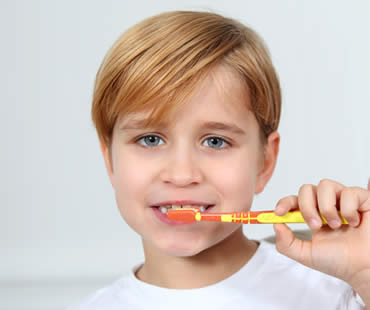
Your teeth and gums are physical assets that you want to keep healthy your whole life, and the best way to do that is to take care of them. Proper dental care needs to begin at a young age so that good habits are established for life. It is a parent’s role to teach children proper hygiene, and to ensure they get professional treatment. Here are some ways that you can help your child learn good dental habits.
Supervise brushing:
Parents should watch children brush their teeth, especially for ages seven and under, to ensure the appropriate amount of toothpaste is used and that none is swallowed. Have your child brush for about two minutes, and make sure all areas of the teeth and gums are cleaned. Provide tips and help as needed.
Establish good eating habits:
Teach your child that diet impacts oral health. Some foods worsen plaque buildup and introduce damaging acid into the mouth, leading to increased tooth decay and higher risk for cavities and gum disease. Certain foods and drinks are also known to stain teeth, or cause bad breath.
Promote water consumption:
Drinking water not only is good for your overall health, it’s also helpful to your mouth. Encourage your child to drink water after eating, especially if it’s not possible to brush teeth right away. Also, fluoridated water is proven to help fight cavities.
Visit the dentist:
Begin taking your child to the dentist around age one, so that the child gets good dental care and learns that dental visits aren’t scary. Have a positive attitude about checkups, and consider taking your child to a pediatric dentist who specializes in children’s oral health.
Be a role model:
As the saying goes, practice what you preach. Set a good example of brushing at least twice daily, flossing every day, limiting your intake of staining foods and drinks, and visiting your dentist regularly.
We look forward to seeing you in our Toronto dental office

It is vital for parents to understand not to wait until an oral health problem arises to begin dental treatment for their kids. Parents should be aware that in order for children to have the best chance for healthy teeth and gums throughout life, preventive dentistry is one of the keys.
Good oral care should begin when your child is an infant. As soon as babies start drinking milk, sugars can attack the gums even though there aren’t any teeth yet. To avoid damage, clean your child’s gums by gently rubbing them with a damp soft cloth. Around age one, schedule your child’s first appointment with the dentist. The examination will include looking for any issues, teaching home care, and allowing your child to become accustomed to a dentist setting.
As you child grows, dentists and parents can partner together to teach preventive dentistry habits to children. Dentists can show parents the ideal ways to guide children in proper brushing and flossing, and parents can ensure that the methods are carried out consistently at home. You and your dentist may decide together as your child grows whether to opt for dental sealants to help protect your child’s teeth from potential decay and cavities.
Another aspect of good oral health that parents should be involved in is providing nutritious foods for their children. Your dentist can educate your family on the best foods for your teeth and gums, as well as the foods and drinks to avoid. Some items are known to contribute to tooth decay, gum disease, and staining. Teaching your child to make healthy diet choices will promote a healthy mouth.
Preventative dentistry both at home and in your dentist’s office will make your child feel confident about oral care and become comfortable with the dentist. If the time comes for more extensive services, your child will likely trust the dentist and have less apprehension about the dental visit. Good preventive care, however, helps avoid problems and your child will be less likely to encounter major problems requiring painful procedures and lots of time in the dental chair.
Our dental office is located in Toronto

Teaching your kids good dental habits and making sure they get dental care are some of the most important things you can do for them. Guidelines for helping your child improve their oral health depend upon their ages. Here are some oral health tips for various stages of childhood.
Infants (up to 2 years):
It’s never too early to begin oral care! Clean your baby’s gums with a damp cloth after feedings to remove bacteria. Once the first tooth erupts, use a soft toothbrush for babies to gently brush the teeth and gums. Use a pea-sized dab of toothpaste and brush at least twice a day. Around the first birthday, begin taking your child to the dentist for regular checkups.
Preschoolers (2-4 years):
This age group has the highest incidence of tooth decay, because most preschoolers love sugary foods but may not love brushing their teeth. Brush your child’s teeth yourself until they are old enough to do it well, but continue supervising the process to make sure all areas are clean. Consider flavored or character fluoride toothpastes if it encourages your child to brush. Also, limit the amount of sugary foods and drinks your child consumes.
Young elementary (5-7 years):
As more and more teeth grow in, your child needs to brush carefully with fluoride toothpaste. Make sure all areas of your child’s mouth are being reached, and help your child use dental floss to clean between teeth and gums. Continue helping your child make healthy diet choices.
Older kids (over 8 years):
Most children should be able to brush on their own by age 8, but performing spot checks is a good idea to make sure they are doing a good job. Teach your child to brush after meals, especially when eating sugary or sticky foods, and emphasize the importance of flossing every day. Continue taking your child for regular dental checkups every six months, which will help create a life-long habit of good oral care.
Schedule your appointment at our Toronto dental office

In many households, the bedtime routine is no fun. One of the trickiest parts for some parents is getting their kids to brush their teeth. However, it’s not a part of your child’s routine that should be skipped. To help make taking care of their teeth fun for children, here are some ideas for parents.
Toothbrushes
Provide your kids with fun toothbrushes! By choosing a brush decorated with their favorite character or color, your children will think of their toothbrush more like a toy than a dental tool. Consider getting more than one toothbrush, so each night they can choose the one they want to “play” with at the time.
Toothpaste
Children are picky about their toothpaste flavors just like their foods. Select toothpaste that you know your kids will like. Some of the flavor options include bubble gum and fruits, as well as the standby mint.
Floss
If they start flossing at a young age, your kids will likely view it as part of their oral hygiene routine all of their life. Try using some of the fun flossing tools on the market today, because they may help get your child interested in flossing. There are many colors and shapes to choose from, so keep trying until you find one that motivates your child.
Rewards
Enticing your children with rewards is often an easy way to encourage them to perform a task without arguing. Consider making a rewards chart and giving them a sticker each time they brush and floss. By the end of a week filled with good dental hygiene, a special reward will await them!
Schedule your appointment at our Toronto dental office

Babies obviously can’t take care of themselves, so parents have to handle all aspects of their care. Don’t forget their oral health! Parents need to lay the groundwork for lifelong good dental habits and healthy smiles for their children. Here are some answers to common questions about baby teeth.
Do baby teeth matter?
Primary, or baby, teeth are important. They help children chew naturally and speak clearly. They provide the place for adult teeth to grown in properly later.
Should I brush my baby’s teeth?
You should brush your baby’s teeth without toothpaste, using a small amount of water instead. Use a small, soft-bristled toothbrush at bedtime to remove plaque and bacteria from your baby’s teeth and gums.
When can I start using toothpaste?
Fluoride toothpaste can be implemented after age two, when a child can be trusted not to swallow the toothpaste. Only use a small amount of toothpaste, and watch the child carefully to ensure proper brushing and spitting out the toothpaste.
When should I take my child to the dentist?
Experts recommend taking your child to the dentist when their first tooth appears, or by their first birthday. Your child should be taken for dental visits every six months, or more often if your dentist has concerns.
Do I need a certain type of dentist for my child?
You may choose a pediatric dentist who has been trained specifically to treat children. Their goal is to teach children about oral hygiene and the importance of taking care of their teeth, as well as provide a comfortable experience in visiting the dentist. However, you may also choose a regular dentist to take care of your child’s oral health. It is up to you to decide which kind of dentist is right for your family.
We look forward to seeing you in our Toronto dental office






 E-Mail Us
E-Mail Us  416-595-5490
416-595-5490








